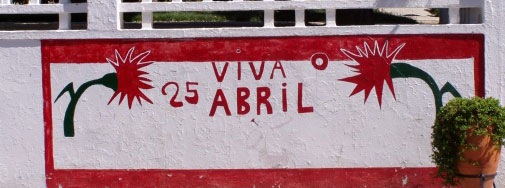The Carnation Revolution 40 years after

International CEMES Conference
Copenhagen, 30-31 October 2014
Organizers
Professor Morten Heiberg, Department of English, Germanic and Romance Studies (ENGEROM); Post doc. Sigfrido Ramírez, the SAXO Institute, and Center for Modern European Studies (CEMES)
Theme
On the occasion of the 40ths anniversary of the Portuguese Revolution in 1974 this international CEMES conference explores and presents the latest international research on the significant political and social changes that took place in South and Western Europe during ‘the long 1970s’. These long 70s went well into the early 1980s as the second oil shock brought economies to a state of deep crisis which coincided with the progressive arrival in Western Europe of social democratic parties in power.
This conference seeks to answer the fundamental question: How do we explain that Europe in this period of turmoil and crisis gradually came to play a more important and self confident role both in its efforts to build an integrated Europe and in global politics?This question is inextricably connected to other questions regarding the final defeat of fascism and the embracing of democracy in Southern Europe: How did countries like Portugal, Spain and Greece within a relatively short period of time manage to overcome internal weaknesses and become sustainable democracies? And what role did new forms of transatlantic interaction and the acceleration of the process of European integration have for this process?
Distinguished international researchers will address these and other important questions on the basis of whole range of newly released documents from European and American archives, just as the conference aims to confront these findings with theories and methodologies of political and social sciences. Keynote speakers are Professor Antonio Varsori of the University of Padova and Professor José Magone of the Berlin School of Economics and Law. We very much welcome students and all those with interest in International history and the History of European integration.
Thursday 30 October 2014 (KUA1, room 27.0.09)
12-14: Arrival/lunch.
14.00: Opening by Jørn Boisen, Director of the Department of English, Germanic and Romance Studies (ENGEROM). University of Copenhagen
14.15: Antonio Varsori (keynote), Università degli Studi di Padova.
We Now Know? Perspective for future historical research about Europe between the 1970s and the 1980s
Session 1: Revolutionary Portugal
15.00: José Magone (keynote), Berlin School of Economics and Law
The domino effect. The Portuguese revolution of carnations as turning point of global politics
15.45: Coffee break
16.00: Raquel Varela, IHC, Universidade Nova de Lisboa, IISH, Amsterdam
The Portuguese revolution in the context of the cold war
16.25: Stuart Ward, ENGEROM/University of Copenhagen
The belated embrace of ‘Descolonização’ in revolutionary Portugal
16.50: Session debate. Moderator: Georg Wink, ENGEROM/University of Copenhagen.
17.30: Closure
18.00: Dinner reception at ENGEROM
Friday 31 October (KUA1, Room 27.0.17)
Session 2: European Integration in the long 1970s
09.15: Sigfrido Ramírez, SAXO/University of Copenhagen
Southern European stabilisation and European integration: the views from the European Commission (1974-1984)
09.40: Pierre Tilly, UCL-Louvain-La Neuve.
The birth of a new European confederation: origins and first steps of the European Trade Union Confederation (1972-1979)
10.05: Jean-Marie Palayret. Former Director of the Historical Archives of the European Union.
France and EPC (European Political Co-operation)'s challenges in times of crisis: some test-cases
10.30: Coffee Break
10.45: Session debate. Moderator: Morten Heiberg, ENGEROM/University of Copenhagen.
Session 3: The United States and the Mediterranean in the era of the Portuguese Revolution
11.15: Mogens Pelt, SAXO/University of Copenhagen.
The Collapse of the Greek Military Regime and the transition to Democracy: Internal Pressures and Foreign Adventures
11.40: Gert Sørensen, ENGEROM/University of Copenhagen.
Italy and the crisis of democracy in the 1970s: From strategy of tension to that of the new media
12.05: Francisco Javier Rodríguez Jiménez, Universidad de Salamanca.
Forerunners of change? The AFL-CIO and the Spanish labour unions, 1971-1977
12.30: Lunch
13.45: Morten Heiberg, ENGEROM/University of Copenhagen.
The United States and the democratic transition in Spain
14.10: Session debate. Moderator: Gry Thomasen, Danish Institute for International Studies.
Session 4: Iberian transitions. A Northern European Perspective
14.40: Rasmus Mariager, SAXO/University of Copenhagen.
Programmed to Arms Reduction? SPD, the second phase of Ostpolitik, and Social democratic security policies in Scandinavia in the 1970s and 1980s
15.05: Antonio Muñoz Sánchez, ICS - Universidade de Lisboa.
German Social democracy and Iberian transitions to democracy
15.30: Coffee break
15.45: Detlef Siegfried, ENGEROM/University of Copenhagen.
Agencies of a post-industrial society. The alternative milieu in West Germany in the 1970s
16.15: Session debate. Moderator: Sigfrido Ramírez, SAXO/University of Copenhagen
17.00: Closure by Morten Heiberg
20.00 Conference dinner.
